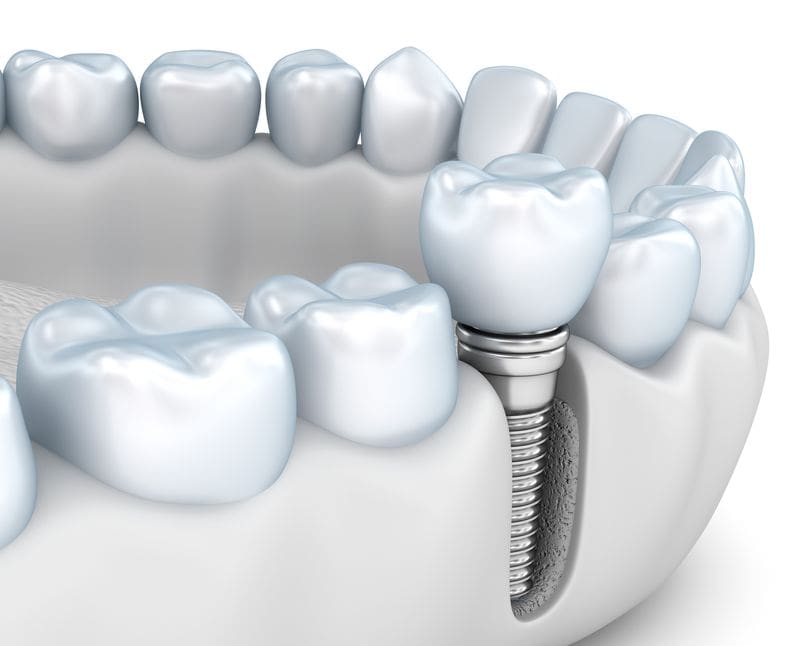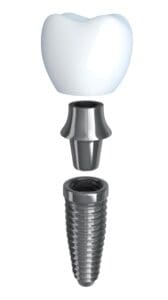Roham Rafat, DDS, MS of Valley Dental Health, is one of the most highly trained periodontists in the Baltimore area. Dr. Rafat offers complete implant dentistry services in our office. While many dentists and oral surgeons restore dental implants in Cockeysville, MD, Dr. Rafat offers complete treatment, from the surgical placement of the implant through cosmetic restoration.
Teeth implants are the best treatment option for oral health and aesthetic purposes. Dr. Rafat also provides general dental services to patients in Cockeysville and Hunt Valley, Maryland.
Why Choose Dental Implants?
When natural teeth are missing or damaged, dental implants are the next best thing. There are many benefits of dental implants, but most importantly, they work and look just like real teeth. They are secure, natural-looking, and the only permanent option to replace missing or damaged teeth. Additionally, dental implants support the preservation of bone mass and health.
Patients with tooth implants can enjoy their favorite foods and activities without worrying about slippage or losing a denture. Dental implants are a versatile tooth loss treatment. Dentists use them to replace a single missing tooth, multiple missing teeth, a whole arch of teeth, or an entire mouth of missing teeth.
The dental restorations that your dentist will secure to the implant are custom-made to fit perfectly in your mouth and blend in naturally. They are also the only option that will support your jaw bone health.

Dental Implants Treatment Stages
For most patients, the dental implant procedure involves two parts: the placement of the implant and the restoration.
Placement Of The Implant
The first step in the process of dental implant placement is the surgical placement of the implant post. This is a crucial and precise procedure that sets the foundation for a successful dental implant.
During this step, Dr. Rafat makes a small incision in the gum tissue to expose the jawbone. Then, he carefully drills a hole into the bone where the implant post will sit. Factors such as the patient’s bone density and the type of implant determine the size and depth of this hole.
Once he creates the hole, he inserts the implant post, which consists of biocompatible titanium. He will ensure that he securely positions it within the bone to provide stability for future restoration. Dr. Rafat can perform this oral surgery from the comforts of our Cockeysville, MD, dental office.
A dental implant actually replaces the root of the missing tooth. Through the healing process of osseointegration, the jawbone fuses with the implant post to form a stable bond with the bone. It will also create a strong and stable foundation for the prosthetic tooth or teeth.
Proper placement of the implant post is essential for the long-term success and functionality of dental implants. Therefore, it’s crucial to at least consult with Dr. Rafat, who specializes in implant dentistry, to ensure accurate and precise placement during this initial step.
Dental Implant Restoration
Once the initial phase of implant placement and osseointegration is complete, the second part of the procedure can begin. The second part of the dental implant procedure involves implant restoration. This part focuses on restoring both the aesthetic appearance and functional capabilities of your teeth.
During this stage, Dr. Rafat will uncover the dental implant by making a small incision in the gum tissue. He will attach an abutment to the implant to serve as a connector between the dental implant and the replacement tooth or teeth.
The abutment plays a vital role in ensuring stability and support for the replacement tooth or teeth. It acts as an anchor, securely holding them in place while mimicking your natural tooth structure.
Finally, once the abutment is securely attached to the dental implant, he will affix the custom-made replacement teeth onto it. These replacement teeth will match neighboring real teeth and improve your chewing and speaking ability. For a single missing tooth, he will use a dental crown. Dr. Rafat may use a dental bridge or denture for multiple missing teeth.
Dental implant prosthetics not only restore beauty but also help improve your overall oral health. A stable foundation for prosthetic teeth helps. Patients can regain their confidence with a fully restored smile that looks and functions just like natural teeth.
Patient Review
Maintaining Your Dental Implants
Once your teeth have been replaced with dental implants, now you must maintain them so they last. Taking good care of your oral health and overall health will ensure the long term success of your new teeth. We compiled a list of basic things you should do and expect to make sure your implants never fail.
- Maintain Proper Oral Hygiene At Home: Your dental implant-secured restoration will require regular care, just like your natural teeth. This will include brushing, flossing, and any additional care that your dentist suggests. These daily habits will remove plaque to prevent gum disease. We suggest using a soft bristle toothbrush and non-abrasive toothpaste to brush your teeth twice a day. You need to floss around the implant at least once a day to remove food particles and debris.
- Visit Your Dentist Two Times a Year: Regular dental visits are very important for many reasons. However, when you have dental implants, your dentist can spot a problem early on and save them from failure. At each appointment, your dentist will examine your implants, the dental restoration, and the surrounding tissues to make sure everything is healthy and working as it should. At least once a year, we will take dental x-rays to monitor the implants and the bone around them.
- Refrain from Smoking: Smoking cigarettes or using any other form of tobacco is very bad for your oral health. It will increase your risk of dental diseases and implant failure. The only way to avoid this is to quit smoking and using tobacco products altogether. This will also support your overall health which will contribute to the longevity of your implants.
- Eat a Healthy Diet: Eating healthy foods will support your overall health and help promote good oral health. This is very important for lowering your risk of implant failure. A diet high in sugar and starches will contribute to decay and disease.
Dental Implant FAQs
As the number one treatment for missing teeth, dental implants are complex and intimidating for some patients. Here is a list of some of our top frequently asked questions. Please review them and reach out to us or schedule a consultation if you have additional questions.
Are Dental Implants Painful?
Dental implants involve several procedures that are surprisingly comfortable. We provide various sedation dentistry options to ensure you stay relaxed and comfortable during your treatment.
We also use anesthetics when necessary for your comfort. Most people only report minor discomfort and swelling that is controlled with over-the-counter medication after their procedures.
I Have More Than One Missing Tooth. Can I Still Use Dental Implants?
 Yes, your dentist can use a dental implant to replace one missing tooth or to replace all of your missing teeth by supporting a denture or bridge. Dr. Rafat may need to place as few as two dental implants to secure a denture or bridge. After a thorough exam and analysis of your current oral health, he will recommend the best dental implant treatment for you.
Yes, your dentist can use a dental implant to replace one missing tooth or to replace all of your missing teeth by supporting a denture or bridge. Dr. Rafat may need to place as few as two dental implants to secure a denture or bridge. After a thorough exam and analysis of your current oral health, he will recommend the best dental implant treatment for you.
Are Dental Implants Permanent?
Dental implants are designed to be a long-term solution for tooth loss. However, their success and longevity depend on how well they are cared for. Your oral hygiene routine and overall health habits play a major role in whether or not your implants will fail or remain intact for a lifetime. While your implants will stay in place forever, they may need to be replaced due to normal wear and tear.
What Is Peri-Implantitis?
This is a serious infection that occurs in the soft and hard tissues that surround the dental implants. It develops when bacteria builds up around the implant posts and gum tissue. The gums will typically recede, expose the implants, and create pockets where bacteria will thrive.
It is similar to gum disease; however, it surrounds implants instead of just the gums. Left untreated, it will cause the implants to fail and your dentist will have to remove them. Lack of proper oral hygiene care and skipping dental appointments is the most likely cause of peri-implantitis.
Can you get dental implants after dentures?
Yes, you can get dental implants after using dentures. Dental implants can provide a more permanent and stable solution for missing teeth. Your dentist will assess your jawbone to ensure it’s strong enough to support implants. Tooth implants can improve comfort and function compared to traditional dentures.
To learn more about the dental implant services at our Hunt Valley dental office, visit:
- What are Dental Implants
- Benefits of Dental Implants
- Dental Implants FAQ
- Cost of Dental Implants
- Dental Implant Procedure
- Dental Implants vs Dentures
- Single Tooth Dental Implant
- Dental Implants for Multiple Teeth
If you are missing teeth and interested in the benefits of dental implants in Hunt Valley, MD, schedule a dental implant consultation with Dr. Roham Rafat at our state-of-the-art dental practice. He will discuss your dental health, cosmetic goals, and budget concerns to determine if dental implants are right for you. Valley Dental Health is currently accepting new patients.
